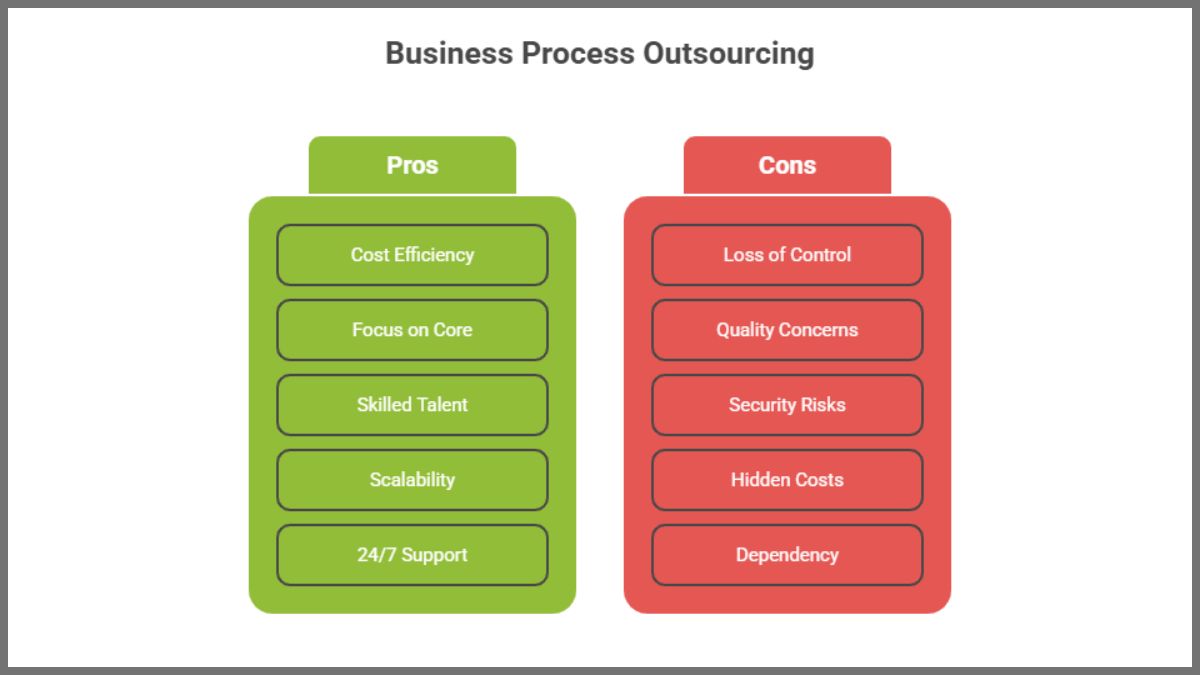Outsourcing can be a game-changer for businesses, especially in today’s fast-paced and demanding market. One common buzzword you’ve probably come across is BPO. But what exactly is BPO, and more importantly, is it right for your business?
In this post, we’ll walk you through the key advantages and disadvantages of BPO (Business Process Outsourcing) so you can make an informed decision. Whether you’re a startup founder wearing multiple hats or a growing enterprise aiming to reduce operational load, this guide is for you.
What is BPO?
Let’s keep it simple. BPO stands for Business Process Outsourcing. It’s when a company hires another company or third-party service provider to handle certain business tasks.
These tasks can range from customer support and IT services to payroll, data entry, and even marketing.
Think of it like this — instead of doing everything in-house, you assign some of those jobs to outside experts. This can save you time, reduce costs, and allow your team to focus on core business activities.
The Top Advantages of BPO
So, why are more and more companies turning to BPO? Let’s take a closer look.
1. Cost Efficiency
One of the biggest reasons businesses embrace BPO is to cut costs. Hiring and training an in-house team requires a lot of money — salaries, benefits, infrastructure, and overhead costs can really add up.
By outsourcing certain tasks to specialists, especially in India with lower labor costs, you can get the job done at a fraction of the price.
2. Focus on Core Operations
Every business has a core mission. But in between managing emails, resolving customer queries, or handling data entries, we often lose sight of the bigger picture.
With BPO, you can hand off those time-consuming jobs so your internal team can do what they do best — innovate, strategize, and grow the business.
3. Access to Skilled Talent
Let’s say you need advanced IT support — but hiring a whole tech team in-house isn’t realistic. This is where BPO shines.
By outsourcing, you instantly tap into highly experienced professionals who are trained, equipped, and ready to go. No need for long hiring cycles or expensive training programs.
4. Improved Scalability
Scaling a business is hard — but it’s a lot harder when you’re tied down by operational tasks. BPO gives you the flexibility to scale faster.
Need more customer support agents during the holidays? A BPO provider can quickly step in. Want to reduce services in the off-season? That’s easy too. BPO adapts with your needs seamlessly.
5. Round-the-Clock Service
Customers now expect instant solutions — no matter the hour. Partnering with a BPO provider from a different time zone allows your business to offer 24/7 support and faster response times. That’s a win for customer satisfaction.
6. Boost in Productivity
When employees aren’t bogged down with repetitive tasks, their efficiency goes up.
Offloading tedious processes like data entry or payroll allows your in-house team to spend their energy on projects that truly matter. This boosts not only productivity but morale too.
The Disadvantages of BPO
Of course, BPO isn’t without its challenges. Let’s examine a few drawbacks you should consider.
1. Risk of Losing Control
When someone else is handling key functions of your business, you may feel like you’re not in complete control.
While the main operations remain in-house, BPO providers manage specific processes. If not properly overseen, this can lead to inconsistent service or misaligned goals.
2. Quality Concerns
Not all BPO providers are created equal. A poor outsourcing partner may affect the quality of your services or products, and that can harm your brand image.
For example, if a customer support representative with limited language skills handles your clients — that could create confusion or frustration.
That’s why it’s crucial to choose a reliable and experienced vendor.
3. Security Risks
Data is gold in today’s world — and outsourcing means sharing sensitive business information with an external team.
If your vendor doesn’t follow strong cybersecurity practices, your data may be at risk of leaks or breaches. Always vet your partners thoroughly and confirm they meet compliance standards.
4. Hidden Costs
BPO can be cost-effective — but only when managed wisely. Some providers charge for extra revisions, faster turnarounds, or unexpected service additions.
To avoid surprises, make sure you understand the contract terms and pricing structures clearly.
5. Dependency on External Partners
Relying too much on a third party can be a slippery slope. If the vendor faces an internal issue or shuts down operations unexpectedly, it could disrupt your entire workflow.
Over-reliance means less flexibility and more risk if your vendor relationship goes south.
BPO Advantages vs BPO Disadvantages
| Advantages | Disadvantages |
|---|---|
| Cost Efficiency – Lower operational and labor costs. | Loss of Control – Less direct supervision of outsourced tasks. |
| Focus on Core Activities – More time for strategy and growth. | Quality Concerns – Risk of inconsistent service or standards. |
| Access to Skilled Talent – Tap into expert knowledge instantly. | Security Risks – Sensitive data may be exposed to breaches. |
| Scalability – Easily increase or reduce services as needed. | Hidden Costs – Unclear contracts may lead to extra charges. |
| 24/7 Operations – Serve customers across time zones round-the-clock. | Vendor Dependency – Heavy reliance on external teams can pose risks. |
| Improved Productivity – In-house teams can focus on impactful tasks. | – |
Is BPO Right for Your Business?
So, how do you know if outsourcing is the right move? Start by asking yourself:
- Are we spending too much time or money on non-core operations?
- Do we lack in-house expertise for certain specialized tasks?
- Is our team struggling to keep up with customer demands?
- Do we have limited capacity to scale quickly?
If the answer is “yes” to most of these, then BPO could be a smart solution.
And if you’re ready to take the plunge and start your own BPO company, here’s a detailed guide to help you get started.
Tips for Choosing the Right BPO Provider
Here’s a checklist to help you pick the best vendor for your needs:
- Experience: Look for years of industry experience and client testimonials.
- Communication: Choose a partner who is transparent and responsive.
- Technology: Ensure they use updated software and tools to support your business.
- Scalability: Your vendor should be able to grow with you, not against you.
- Security: Confirm they follow best practices for data protection and compliance.
Final Thoughts
Like any business decision, choosing to outsource is all about balance. While BPO offers major perks like cost savings, better focus, and professional expertise, it does come with its share of risks.
But with the right partner, clear goals, and regular communication, BPO has the potential to genuinely uplift your business operations.
Want to stay ahead in a competitive market? Sometimes, knowing when to let go is just as important as knowing how to hold on.
What do you think — is BPO a fit for your business journey?





